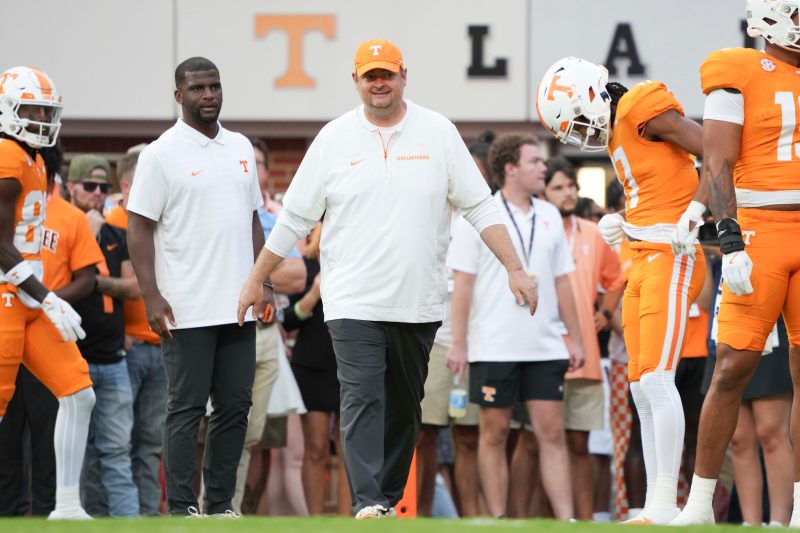
- Josh Heupel said no one is bigger than Tennessee’s program as he said farewell to quarterback Nico Iamaleava. His next move? Hunt for a transfer QB.
- Coaches bemoan lack of roster control, but their demand for transfers contributes to transfer supply.
- Tennessee sued the NCAA, spurring a settlement that further empowered athletes. Beware of the monsters you help create.
The irony hung thick in the air, like the springtime pollen in East Tennessee.
Tennessee coach Josh Heupel said “no one is bigger than the” program, explaining why the Vols were moving on from money-hungry starting quarterback Nico Iamaleava. In the next breath, Heupel explained that the Vols would pursue a transfer quarterback to fill the void created by Iamaleava’s departure.
Tennessee would benefit from another starting quarterback leaving his team after spring practice, entering the transfer portal and pursuing greener pastures.
In other words, Tennessee seeks a Nico to replace Nico.
“Going to have to find another (quarterback),’ Heupel said after Tennessee’s spring game.
Here comes another round of the transfer sweepstakes, as coaches line up to make an acquisition they hope will help their roster.
The transfer portal opened Wednesday, igniting college football’s second free-agency period in a span of four months. Coaches find the lack of roster control that accompanies multiple transfer windows to be a maddening situation, but their actions contribute to this situation.
It’s simple supply and demand. If coaches showed no demand for transfers in this April free-agency period, the supply would dry up.
Iamaleava isn’t the only player leaving a team in a lurch this spring. To wit, California’s All-America running back Jaydn Ott hit the portal, and Oklahoma quickly poached him.
Iamaleava stood to make more than $2 million this season from Tennessee’s NIL collective, but he sought to sweeten his deal. He reportedly wanted $4 million. Tennessee wouldn’t cave to that figure, and Iamaleava skipped practice Friday, skipped Tennessee’s spring game and entered the transfer portal.
How to curtail these types of situations in the future?
Well, what if no coach offers Iamaleava a lifeline and he withers in the portal? This would signal that coaches refuse to play the game of starting quarterbacks leaving their teams after spring practice. And what if Heupel had announced Saturday that Jake Merklinger, Iamaleava’s trusty backup, would be Tennessee’s starter, instead of announcing that he’s going transfer shopping?
If those actions happened, it might make the next quarterback think twice before pulling this maneuver.
But that’s not going to happen, is it?
Iamaleava’s too talented to go without a home, although I’m skeptical he’ll secure a $4 million offer. The market doesn’t seem particularly hot for him, but I can’t imagine he won’t generate interest if he lowers his price. He’s the top-rated transfer in the 247Sports rankings. If Iamaleava finds a destination and displaces the starter at his new program, that quarterback could then enter the portal.
Demand for transfers spurs more supply.
Tennessee won’t rush to anoint Merklinger, a loyal backup who signed as a four-star recruit. He’s one of two scholarship quarterbacks left on Tennessee’s roster. The Vols made the College Football Playoff with Iamaleava starting last season. They retained playoff potential in 2025 if Iamaleava had not transferred. With Merklinger starting, that playoff potential goes poof. So Heupel will try to seize a transfer quarterback who improves Tennessee’s outlook.
Round and round we go.
Nico Iamaleava overplayed hand at Tennessee
To be clear, Iamaleava misplayed this situation. He would have generated more demand and done less reputational damage if he had transferred in December, after Tennessee’s first-round playoff loss. He also would have given himself more time to learn the offense and assimilate with the roster at his destination school. Schools that otherwise might have been interested in Iamaleava already identified their starters by the time he decided to transfer. Also, an SEC rule requires players who transfer within the conference in the spring window to sit out a season before playing. That further hamstrings Iamaleava.
Tennessee, too, would have been better off knowing in December it would play this season without him.
This presents as a lose-lose situation, and still, Iamaleava’s decisions and Tennessee’s response feed kindling to the fires of the spring portal.
Tennessee sued NCAA, empowered athletes like Nico Iamaleava
Coaches and administrators have called upon the high heavens for “guardrails” to allow schools more roster control. One possible solution would include a collective bargaining agreement with athletes that allows schools more roster control, but the NCAA has steadfastly declined to pursue this avenue. Coaches and administrators repeatedly and unsuccessfully call on Congress for help.
Meanwhile, the NCAA keeps losing legal battles.
In a karmic twist, Tennessee’s attorney general sued the NCAA after the association tried to investigate the Vols for possible violations of NIL rules during their recruitment of Iamaleava. Tennessee’s administration stood behind its program and Iamaleava and publicly scolded the NCAA.
In a win for athletes’ money-making prospects, Tennessee’s federal lawsuit resulted in a settlement that further kneecapped the NCAA’s ability to regulate NIL dealmaking and smashed whatever flimsy NCAA guardrails existed surrounding NIL.
Beware of the monsters you help create.
Schools claim to want guardrails, right up to the point where those guardrails affect their ability to win and assemble the best roster.
Coaches bemoan their lack of roster control, while marching toward the transfer shopping market.
Supply, meet demand.
Demand, meet supply, while coaches call out for someone to save them from themselves.
Blake Toppmeyer is a columnist for the USA TODAY Network. Email him at BToppmeyer@gannett.com and follow him on X @btoppmeyer. Subscribe to read all of his columns.
